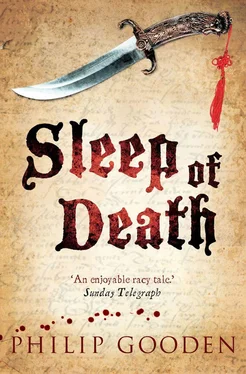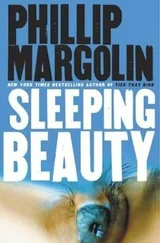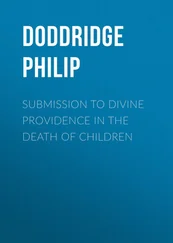Philip Gooden - Sleep of Death
Здесь есть возможность читать онлайн «Philip Gooden - Sleep of Death» весь текст электронной книги совершенно бесплатно (целиком полную версию без сокращений). В некоторых случаях можно слушать аудио, скачать через торрент в формате fb2 и присутствует краткое содержание. Год выпуска: 0101, ISBN: 0101, Издательство: Constable & Robinson, Жанр: Исторический детектив, на английском языке. Описание произведения, (предисловие) а так же отзывы посетителей доступны на портале библиотеки ЛибКат.
- Название:Sleep of Death
- Автор:
- Издательство:Constable & Robinson
- Жанр:
- Год:0101
- ISBN:9781472104311
- Рейтинг книги:5 / 5. Голосов: 1
-
Избранное:Добавить в избранное
- Отзывы:
-
Ваша оценка:
- 100
- 1
- 2
- 3
- 4
- 5
Sleep of Death: краткое содержание, описание и аннотация
Предлагаем к чтению аннотацию, описание, краткое содержание или предисловие (зависит от того, что написал сам автор книги «Sleep of Death»). Если вы не нашли необходимую информацию о книге — напишите в комментариях, мы постараемся отыскать её.
Sleep of Death — читать онлайн бесплатно полную книгу (весь текст) целиком
Ниже представлен текст книги, разбитый по страницам. Система сохранения места последней прочитанной страницы, позволяет с удобством читать онлайн бесплатно книгу «Sleep of Death», без необходимости каждый раз заново искать на чём Вы остановились. Поставьте закладку, и сможете в любой момент перейти на страницу, на которой закончили чтение.
Интервал:
Закладка:
Nick: Then you know him better than I do, my lady. I find him hard to. . describe. He plays the Ghost, you know, in this tragedy of the Prince of Denmark, and that seems a part which is especially fitted to him.
Sir Thomas: How so?
Nick: A ghost is everywhere and nowhere on this earth. He materialises and then vanishes, without a by-your-leave. You might see him but you cannot seize him. And when he speaks, we pay attention because he carries intelligence from some place the rest of us have never been.
Lady Alice: You mean to make your Shakespeare mysterious.
Nick: I hardly know him, as I say. I’m only a humble player. He is the author. But he did me a good turn recently when he rescued me from the attentions of a boatman who had his arm across my windpipe.
Sir Thomas: Then your company author must be a strong man, I wouldn’t choose to wrestle one of the Thames boatmen. I have some respect for him now.
Nick: He overcame him with words.
Lady Alice: Oh, words.
Nick: There was a certain balance in the case, my lady, because the boatman had taken exception to one of my words, and was trying to throttle me because of it.
Lady Alice: A rude word?
Nick: Worse, my lady. A would-be witty word. I was stupider than I knew and our author rescued me from it. Tell me, Lady Alice, he has never visited this house, has he?
Lady Alice: Who?
Nick: Master Shakespeare.
Lady Alice: Would I have asked you about him if he had?
Nick: I thought perhaps. . maybe. . when your first husband. . it might have slipped your. .
Lady Alice: I know there is a fashion now for taking up with theatre people, and in the highest circles of the land too, but Sir William, my first husband, didn’t really hold with them. He was rather set in his ways. I think he still thought of your kind as a — what did you call it? — a bunch of tatterdemallions in an inn-yard. So it’s most unlikely that anybody from your world could ever have crossed our threshold. Not even Master Shakespeare. Why do you ask?
Nick: Oh, no reason, my lady.
Sir Thomas: That means that Master Revill here does have a reason — but doesn’t want to reveal it.
Of course I had a reason. I wanted to know why the initials WS were carved into the tree where, I was pretty certain, a murderer had been crouching. I didn’t want to think that a principal shareholder and occasional player in the Chamberlain’s Men (let alone the leading author of our times) had somehow crept over a garden wall and secreted himself up a pear tree. Even less did I wish to contemplate the idea of this reserved, likeable man dropping down from his leafy perch, creeping across the grass and, in some manner as yet undetermined, putting an end to the sleeping life of Sir William Eliot.
True, Master WS was a proficient in the art of murder — just as he was in those other dark arts of lying, cheating and forswearing, of slander, theft, mutilation and mayhem. To say nothing of treasons, plots, conspiracies and stratagems, as well as the more homely gamut of envy, lust, sloth and avarice. Master WS was quite familiar with all these things because it was his job to sound humanity to its nethermost depths. He is a playwright and daily presents us with our vices and virtues, leaving us to choose whether or not to acknowledge them. Everything human is known to him; nothing, perhaps, repels him.
But knowing is one thing and doing is another. Master WS might show what passed through the mind of cut-throat or cut-purse as he lay waiting for his prey, but that didn’t mean that he was either one of those creatures. All are at liberty to think murder, and some of us may speak it, but few, thank God, do the deed.
There must be other explanations. And now I cudgelled my brains to come up with them. As: suppose that the ‘WS’ I had seen inscribed in the bark stood for Walter Self or Will Savage or Wynne Sourdough. And then I thought that these initials most probably signified Wrong Scent, for I was becoming less and less convinced by my train of reasoning. Perhaps I had imagined those initials in the bark, I had been so eager to discover the mark of a lodger in the tree.
In my notebook and using my Greek lettering I had little to transcribe that night. I’d found out almost nothing from my supper with Sir Thomas and Lady Eliot and William, except that her first husband had disapproved of plays and players. Like many who lived to the north of the river Sir William considered them, considered us, a threat to good order. The theatre enticed apprentices away from their masters’ service. The theatre encouraged lewdness and other low thoughts and bad acts. My lady Alice, however, differed from her late husband. She had a taste for the saltier comments of clowns — I recalled Tarlton’s reversed ‘cuff’ remark. I recalled too the low-cut gown that my lady was wearing. And then I shut my little book wearily, and considered going to William on the next day and telling him that my stay in his mother’s house was fruitless, for there was nothing to uncover. In truth, I felt that I should move back to my side of the river, and return to my kind, the players and whores and ruffians, the superannuated soldiers and sailors of Southwark. It was generous of William Eliot to have offered me hospitality, whatever his ulterior motive, but I could not repay him except with titbits of gossip about the Chamberlain’s Men — and even here, there wasn’t that much to tell. It was as my Nell had claimed: they were, with odd exceptions like Robert Mink, the most regular group of men.
There was a tap at my door, accompanied by a whispered ‘Master Revill? Nick?’
I recognised Lady Alice’s low tones. I picked up my candle and moved to the door, scarcely a stride away. I was a guest but not an important one — a player, for God’s sake — so my accommodation was at the top of the house in a tiny monk-like room. Lady Alice stood outside, dressed as she had been at supper and during the household prayers which followed.
‘May I come in?’
She leaned forward as she spoke so that I caught a whiff of her breath, still scented with the meats of supper, and glimpsed her small teeth, not too discoloured and with only a few gaps, considering her age.
For answer I drew to one side. You cannot refuse the lady of the house. My room was small, as I have said, but even so she brushed past me closer than required as she entered and I felt the soft graze of her breasts. ‘William isn’t here, I’m afraid,’ I said too quickly. Once or twice her son and I had sat up of an evening, discussing the philosophy of playing as well as exchanging gossip.
‘I know. It was you I wanted to see.’
She shivered slightly. There was no fire in the room and the casement was open. I made to shut it. From the window, positioned high up at the back of the house, I could see the river’s black sheen.
‘I thought that all country people disliked the night air.’
I had been brought up to believe that the night air was indeed unwholesome but I felt that the remark was intended somehow to ‘place’ me. I was no true Londoner, but a rustic.
There was a truckle-bed and a trunk in the room. I gestured nervously at the trunk which was covered with a thick cloth and served me as table. She sat down daintily. I perched uneasily on the bed, lower than her, and waited. She picked up my little notebook and glanced at its contents by the flickering candlelight.
‘Why, this is not English,’ she said.
‘It is Greek,’ I said, praying that she could not understand those symbols and not wanting to explain the feeble code I employed whereby each term was simply transposed into the letters of the Greek alphabet.
‘An educated man.’
‘Within my limits, my lady. My father insisted that I learn Latin and Greek from an early age. He undertook my tuition himself.’
Читать дальшеИнтервал:
Закладка:
Похожие книги на «Sleep of Death»
Представляем Вашему вниманию похожие книги на «Sleep of Death» списком для выбора. Мы отобрали схожую по названию и смыслу литературу в надежде предоставить читателям больше вариантов отыскать новые, интересные, ещё непрочитанные произведения.
Обсуждение, отзывы о книге «Sleep of Death» и просто собственные мнения читателей. Оставьте ваши комментарии, напишите, что Вы думаете о произведении, его смысле или главных героях. Укажите что конкретно понравилось, а что нет, и почему Вы так считаете.












